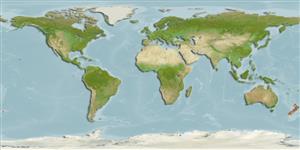分类 / Names
俗名 | 同种异名 | Catalog of Fishes(属, 种) | ITIS | CoL | WoRMS | Cloffa
Environment: milieu / climate zone / depth range / distribution range
生态学
海洋 底中水层性; 深度上下限 0 - 20 m (Ref. 13227). 溫帶
Southwest Pacific: throughout New Zealand. Records from Chatham Islands are unconfirmed (Ref. 9003).
西南太平洋: 在紐西蘭各處。 來自 Chatham 島的紀錄未被證實。 (參考文獻 9003)
大小 / 重量 / 年龄
Maturity: Lm ? range ? - ? cm
Max length : 6.7 cm SL 雄鱼/尚未辨别雌雄; (Ref. 13227); 最大年龄: 3.00 年 (Ref. 13227)
背棘 (总数) : 24 - 31; 背的软条 (总数) : 11 - 14; 臀棘: 2; 臀鳍软条: 23 - 27; 脊椎骨: 40 - 45. First dorsal fin spines V-VIII; second dorsal fin spines XIX-XXIII; third dorsal fin rays 11-14.
Discontinuous lateral line tubular scales 19-24, notched scales 14-24. Total vertebral number 43-45. Snout profile steep (70-75°). Preoperculo-mandibular canal with 7 pores, 3 at lower corner of preopercular, 3 at tip of upper jaw and 1 at lower jaw symphysis. Scale rows between anterior end of second dorsal fin and lateral line, 5-6. Scales between second and third dorsal fins, 4. Scales around caudal peduncle 12-13. Radii in scales from area below lateral line and under pectoral fin, 8-11. Long ctenii in scales from above and below lateral line in caudal peduncle area. Lateral line canal constricted with W-shaped anterior and posterior openings. Short denticles on interradial circuli. Post-temporal partially exposed. Pterygiophore supporting first segmented ray of third dorsal fin anterior to 24th vertebra. Dorsal fin formula V-0N-0-1-0-1. Ventral edge of lower caudal plate straight. Short neural spine of second preural vertebra. Epurals of different length. Soft rays in caudal fin, 14; 2 unbranched and 5 branched (non multibranched) rays in upper and lower caudal lobes. Procurrent rays in upper caudal lobe, 10; eight in lower lobe, 8; in upper lobe, 2 procurrent rays between upper lobe and posterior epural, 4 rays opposite epurals , 1 between neural spine of second preural vertebra and neural spine of third vertebra, 1 opposite neural spine of third preural vertebra and 2 anterior to neural spine of third vertebra; in lower lobe, one procurrent ray between lower lobe
and haemal spine of second preural vertebra, 5 rays opposite haemal spine of second preural vertebra, 1 between haemal spines of second and third preural vertebrae, 1 ray opposite neural spine of third preural vertebra. Rounded posterior end. Short, pointed rostrum. Broad antristrum. Excisura shallow (Ref. 84085).
Facultative air-breathing in the genus (Ref. 126274); Adults are most common in shallow water (0-5m), although recorded from depths of 30 m (Ref. 84085). They are commonly found in intertidal rock pools, particularly those with adequate rocky or algal shelter. They feed mainly on amphipods, isopods, and polychaetes (Ref. 13227). Eggs are hemispherical and covered with numerous sticky threads that anchor them in the algae on the nesting sites (Ref. 240). Larvae are planktonic which occur primarily in shallow, nearshore waters (Ref. 94114).
普遍地栖息于潮间带的岩石区潮池, 特别地那些具有适当的岩石或海藻的庇护所。 主要吃片脚类动物,等足目动物与多毛类动物。
Life cycle and mating behavior
Maturities | 繁殖 | Spawnings | Egg(s) | Fecundities | 仔鱼
西南太平洋: 在紐西蘭各處。 來自 Chatham 島的紀錄未被證實。 (參考文獻 9003)
Fricke, R., 1994. Tripterygiid fishes of Australia, New Zealand and the southwest Pacific Ocean (Teleostei). Theses Zool. 24:1-585. (Ref. 13227)
人类利用
渔业: 没有兴趣
工具
特别资料
下载 XML
网络资源
Estimates based on models
Preferred temperature (Ref.
123201): 10.4 - 18.5, mean 14.9 °C (based on 161 cells).
Phylogenetic diversity index (Ref.
82804): PD
50 = 0.5039 [Uniqueness, from 0.5 = low to 2.0 = high].
Bayesian length-weight: a=0.00562 (0.00299 - 0.01058), b=3.10 (2.94 - 3.26), in cm total length, based on LWR estimates for this species & (Sub)family-body (Ref.
93245).
营养阶层 (Ref.
69278): 3.2 ±0.45 se; based on food items.
Generation time: 0.9 ( na - na) years. Estimated as median ln(3)/K based on 1
growth studies.
回复力 (Ref.
120179): 高度, 族群倍增时间少于 15个月 (K=1.20; tmax=3).
Fishing Vulnerability (Ref.
59153): Low vulnerability (11 of 100).
Nutrients (Ref.
124155): Calcium = 130 [65, 298] mg/100g; Iron = 0.491 [0.264, 0.997] mg/100g; Protein = 17.2 [16.0, 18.3] %; Omega3 = 0.422 [0.172, 0.977] g/100g; Selenium = 9.31 [3.45, 25.01] μg/100g; VitaminA = 35.9 [7.7, 169.3] μg/100g; Zinc = 1.32 [0.84, 2.00] mg/100g (wet weight);
